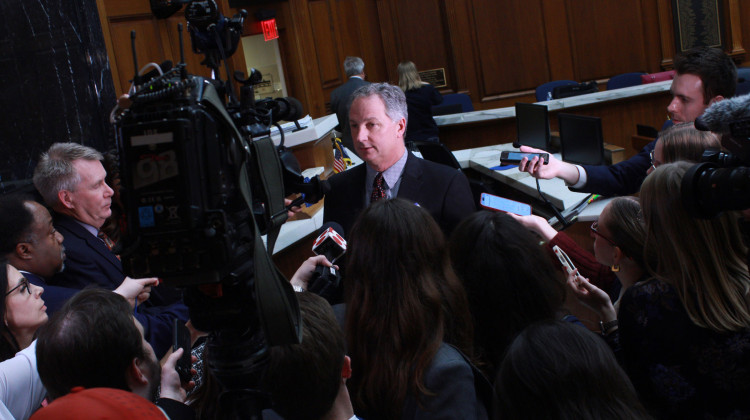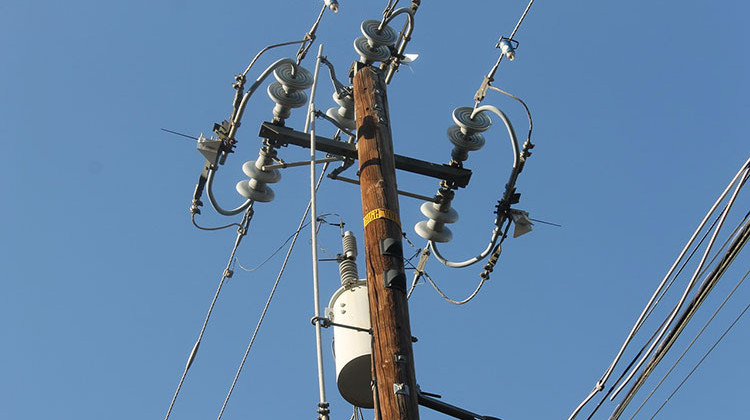
Farmland, located southwest of the intersection of Davis Road and Troy Avenue, is seen on May 27, 2025, in Franklin Township on the south side of Indianapolis. The land is the proposed site of a multi-building data center.
Jenna Watson / Mirror IndyA correction was made on June 17, 2025: A previous version of this article mischaracterized the value of the sales tax breaks.
If a developer gets the go-ahead to build a data center in Franklin Township, state and local taxpayers could be on the hook for some of the project’s cost.
Data centers use community resources, like electricity, but since they qualify for extensive tax breaks in Indiana, they only contribute a fraction of the taxes that other companies pay to state and local governments. Taxes allow public agencies to fund services like Medicaid and food assistance initiatives, and distribute funds to counties so they can pay for things such as public safety and filling potholes.
Tech giants like Amazon, Google and Microsoft are expected to qualify for tax breaks on anywhere from $2.2 billion to $13.2 billion in data center equipment purchases, according to a state tax incentive report. At a sales tax rate of 7%, the state would miss out on anywhere from $150 million to $900 million in potential sales tax revenue that could otherwise be spent on public services.
The number could jump dramatically if 30 other data center proposals are approved to operate in Indiana. Other states have reported data center tax abatements being larger than originally projected, reaching close or into the billions.
These are funds that could, over time, help the state offset a $2 billion state budget crunch that led to large cuts to social services earlier this year.
“Seven projects with total expected investment of $20.8 billion have qualified for the sales tax exemption for data center equipment,” according to the state’s Office of Fiscal and Management Analysis. “This incentive likely provides a significant reduction in data center costs. However, it is not currently possible to estimate its fiscal or economic impact due to data limitations.”
A state law allows counties to decide whether they want to provide property tax exemptions to data centers. Another law allows companies to buy qualifying equipment without paying state sales and use taxes for up to 50 years. The facilities must purchase cables, computers and other equipment, which has to be replaced every few years.
There’s also a sales and use tax exemption for a data center’s energy operator — AES Indiana would power the one in Franklin Township. Although the proposal to build a data center near Beech Grove is still under consideration, AES recently began a search for a thermal developer to build more electricity generators, which could power the facility.
Data centers house computer servers that store, process and distribute data. They’re a vital part of accessing emails, texts and the internet. Requests for large quantities of land to build the facilities on have skyrocketed as businesses rush to make advancements in artificial intelligence, and retiring farmers help meet the demand.

But are they worth the cost?
The number of positions in Indiana’s recent data center contracts typically range from 8 to 50. Economic development advocates say that number pales in comparison to potentially thousands of positions if a manufacturing plant or another business were developed instead. Data centers also contribute to many environmental issues, including water contamination, noise and light pollution and increases in carbon dioxide emissions, just to name a few. These in turn can cause health problems for residents.
Kasia Tarczynska is a senior research analyst with the national policy resource center Good Jobs First, which advocates against tax breaks. She recently spoke to Mirror Indy about the financial impact of giving tax incentives to data centers.
This conversation has been edited for length and clarity.
Elizabeth Gabriel: Why do state officials approve laws that allow data centers to get tax abatements?
Kasia Tarczynska: Elected officials think that the best way of capturing the growth of this industry is by providing tax breaks. This is the way economic development has been done for decades in this country — by offering incentives rather than competing on (or leveraging) what companies truly need. And companies very often just assume they will get these tax breaks.
Politicians are less willing to invest in something that will take longer to happen and they will not get credit for it when they are not in the office. It’s easier to just say, ‘OK Google, if you come, our state will abate all of your taxes and we’ll give you a special deal on power,’ instead of investing money on educating people and having a very skilled labor force. Because it takes time, (officials) don’t get the effect (or credit) of it right away.
Gabriel: In exchange for receiving tax abatements, some companies have donated money to help schools buy textbooks and other things that are typically supported by property taxes. Can you put into context how a $1 million stipend compares to the amount of property taxes a data center would pay if they didn’t receive any incentives?
Tarczynska: Yes, they can give a stipend to local schools, but this is not economic development. This is just a charity from these companies — it’s not contributing to the budget.
Schools receive a bulk of their money from property taxes paid by businesses and residents. Let’s say Amazon receives a huge property tax abatement, or another company does, it means they are not contributing to local school district revenue. So the district is losing tax money and very often this information is not being released to the public.
But schools aren’t the biggest service that benefits from property taxes — (those funds also support agencies that address) potholes, public health care, senior citizens and public safety.
Gabriel: If lawmakers decide they don’t like these tax breaks, is there anything they can do? Could they, hypothetically, just reverse these tax abatement laws?
Tarczynska: Yeah, they could. Data centers that wanted to come to Louisiana chose a site, went to the state and said, “Look, if you don’t create this subsidy program for us, we’ll go somewhere else.” So they threatened (state officials), but the truth is that they really want to be in a particular place.
Companies make this decision not based on subsidies, but based on business reasons. The first thing they do is look for an area with cheap energy. Then they look for places where there’s a lot of available open spaces and cheap land that they can build on. They’re trying to find areas where they don’t have to deal with huge opposition coming from communities and they want to be in places where there’s no tornadoes or human-made disasters.
So, the subsidies come really late in the process after the decision is made where they want to be.
Gabriel: Is it correct that local governments can choose whether or not to give the personal property tax abatements?
Tarczynska: Yes, they can. Local governments can choose not to provide those property tax abatements, but it does require sometimes thinking outside of the box. It requires courage to say no to Amazon and Google.
I do want to recognize that a lot of times local officials don’t have enough information or data from these giant corporations and they are sometimes put against these really powerful organizations where suddenly you have one lawyer and they come with five lawyers. It’s this imbalance of power in a room so I do want to recognize that sometimes elected public officials just don’t have access to information, but they can demand more from these companies.
They can say, “Look, if you truly want to be in our community you need to negotiate a higher percentage of taxes that you will pay.” Or they can try to work with a state economic development agency or state auditor to support local communities and officials.
Mirror Indy, a nonprofit newsroom, is funded through grants and donations from individuals, foundations and organizations.
Mirror Indy reporter Elizabeth Gabriel covers the south side of Marion County. Contact her at elizabeth.gabriel@mirrorindy.org. Follow her on Facebook at Elizabeth Gabriel, Southside Reporter and on X at @_elizabethgabs.
 DONATE
DONATE








 Support WFYI. We can't do it without you.
Support WFYI. We can't do it without you.